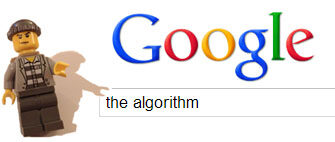Wouldn’t you love to have access to the algorithm that makes or breaks your website’s success?
I’m sure we’ve all dreamt of getting our hands on the algorithm, while trying to improve results or understand a sudden change. Unfortunately, with only a few people in the world actually having access to the full algorithm, and none of those people being SEOs, we all have to try and work it out for ourselves.
But why should we stop dreaming? I asked my fellow SEO Chicks what they would do if they had access to the Google Algorithms, just for a day.

The ideas are fantastic. I can imagine Googlers reading this and rushing to make the algorithms even more secure, knowing what we might get up to if we could!
I hope you enjoy these and would love to hear your ideas in the comments.
To kick it off, it’s a strategic approach from Julie Joyce:
First of all, I’d change it so that a good link would weigh more in terms of importance than a horrible link. A footer link on a 2 page site that hasn’t had more than 40 visitors in 3 years should not count as much as a link on a relevant site that is well worked into the content, shows great social signals, and encourages clicks. Since we’re dreaming here, I’d also remove the webmaster guidelines that say you shouldn’t buy links. Tons of people buy links but if they buy good ones, those should be fine. I wouldn’t let bad links penalize a site though. I’d just not count them.
Secondly, I’d separate the QDF signals for various industries. I don’t think that freshness is as important for certain niches as it is for others and I think that it can encourage some sites to continually produce new content for that reason alone, which can, in some cases, simply create a bloated site.
I’d also roll out updates in a manner that wouldn’t have so much collateral damage. Turn the dial low and then crank it up a bit instead of “accidentally” blowing away a non-EMD site when we’re targeting EMDs. In conjunction with this, if a site was indeed unfairly penalized, I’d create a much more efficient method of evaluating it and restoring it.
Last of all, (and yes I know this isn’t 100% relevant) I’d fix the Adwords system so that once I was doing well and the account was running really smoothly, it wouldn’t suddenly crash and cause me to have to jack up the budget just to do well again.
Next up, the incredibly imaginative Hannah Smith:
The easy answer would of course be to ensure all of my lovely clients rank 1st and their nasty old competitors languish in post page 10 obscurity. That would just be selfish of course, plus as it would only last a day it wouldn’t really make much of a dent in real terms.
As such I think I’d like to break Google, albeit for just a day. Google has a strangle-hold in terms of monopoly and I’d like to try to change that – (NB this is pretty unrealistic given I’ve just a day, but whatever).
We’ll call it Hannah’s Hostile Takeover day. On Hannah’s Hostile Takeover day Google will become worse than useless.
The SERPs will appear unchanged.
However, regardless of whether you click on an organic or paid result you’ll be auto-magically redirected here.
Should you elect to type in a search query related to this then the SERP will be compiled entirely of links to sites devoted to jokes about ‘your mum’.

I expect this will cause people to hit the back button to return to the SERP. When they hit ‘back’ they’ll see the following message:
“Whoops-a-daisy – looks like that wasn’t what you were looking for. Try Bing instead.”
Many will elect not to do this. Instead they will try again with Google.
Still failing to find what they’re looking for they’ll hit back and see this message:
“Oh horlicks! Looks like that wasn’t what you were looking for. Try Bing instead.”
If they are particularly tenacious and still refuse to visit Bing they’ll be forced to try to complete an impossible captcha in order to search again. Try as they might they won’t be able to solve said captcha.
I would hope that the net result is that many people will try Bing. Some might even like it. Some might continue to use it because they are still a bit sore about the Google messing them around like that – after all they are very busy and important. Google lose a little market share.
The End.
And if anyone is left using Google, Nichola Stott says:
To be honest, I’d probably leave well enough alone. Google employs some extremely smart engineers who are immersed in particular component aspects of the algorithms, day-in-day-out and it takes these engineers some time to build a strong update. It would take a hell of a lot more than a day for me to get to grips with even the simplest components.
Instead I’d like to see what factors really are included within the more erroneous factors, such as engagement metrics. Is in-SERP CTR a factor? Are dwell times and page views per referred visit a factor? If so to what extent are known characteristics identified and extrapolated to make meaningful inferences for sites without Google Analytics?
Oh and at 4pm I’d throw Meta keywords back in, just for shits and giggles.
Nichola’s final idea definitely appeals to Judith Lewis:
*hahaha* That would be so funny – from 4pm you would throw the world into chaos.
Which is, in fact, what I would do if I had the algorithms for a day. I’d create a table called “friends” and one called “enemies” and friends would get automatic 1st page rankings whereas enemies would find a rotating penalty based on search volume from -3 to -90.
I’d then have a “random weirdness” list which took obscure conspiracy theory sites and gave them top billing on one in every 3 relevant searches.

Then I’d add in a dash of social metrics, forcing in a random twitter profile every 7th search.
At the end of it all, any SEO who only chases the algo would be in hospital and the rest would be laughing down the pub.
But SRSLY I agree with Nichola. Not only is that sucker the size of a small planet in complexity but the guys who are at the coalface are working their butts off trying to make things work properly and with the best intentions for user experience.
And finally, my day would go something like this:
First off I would put on a witches hat and let out an evil cackle.

Next, I would try to understand the algorithm so that I can learn from it and use this knowledge in future. Because once I’ve understood it enough for my liking, I would delete it! I would then replace it with a simpler algorithm that is much more aligned to how my mum thinks it works.
Results would be displayed according to which letter of the alphabet the domain starts with. There would be 26 pages to choose from each time you search and you would be shown results from a random letter of the alphabet each time you search, in order to keep things fair for all letters.
On each results page the websites would be sorted according to ‘popularity’ (because that’s how my mum thinks it works!). I would get some awesome developers in (and maybe some technology from the future) to take in to account popularity based on the sentiment of within everything written online, everything written offline and every single thing spoken out loud across the world.
If I had time, I’d even make this location based so that those websites with positive discussion locally to you would perform better than they might in other locations.
Websites could then improve their results by improving their popularity – this could take in to account the other common myth that results are based on how much you pay Google – those who start giving loads of money to charity could become more popular and get better results.
One other thing I’d like to do is slightly more frivolous. I’d like to see the pages livened up a bit with a random image on every results page, preferably a Lego minifigure, or a rubber duck. If I was feeling generous, I’d let users pick from a category of images that they want to see on their SERPs – from lolcats to memes to pretty landscapes!
At the end of the day, I hope I will have learnt a lot, had some fun and made the general internet user think about Google from another perspective and not just lap up everything the internet says.
Oh, and Google would have to start from scratch again, which would hopefully mean some things don’t get put back in the algorithm, it wouldn’t have so many elements to it and they can work in new and improved metrics.
I think it’s safe to say that we could cause five days of trouble for Google, their users and SEOs between us. But what would you do?
Image credits: me, youtube, memegenerator and cjdc.



